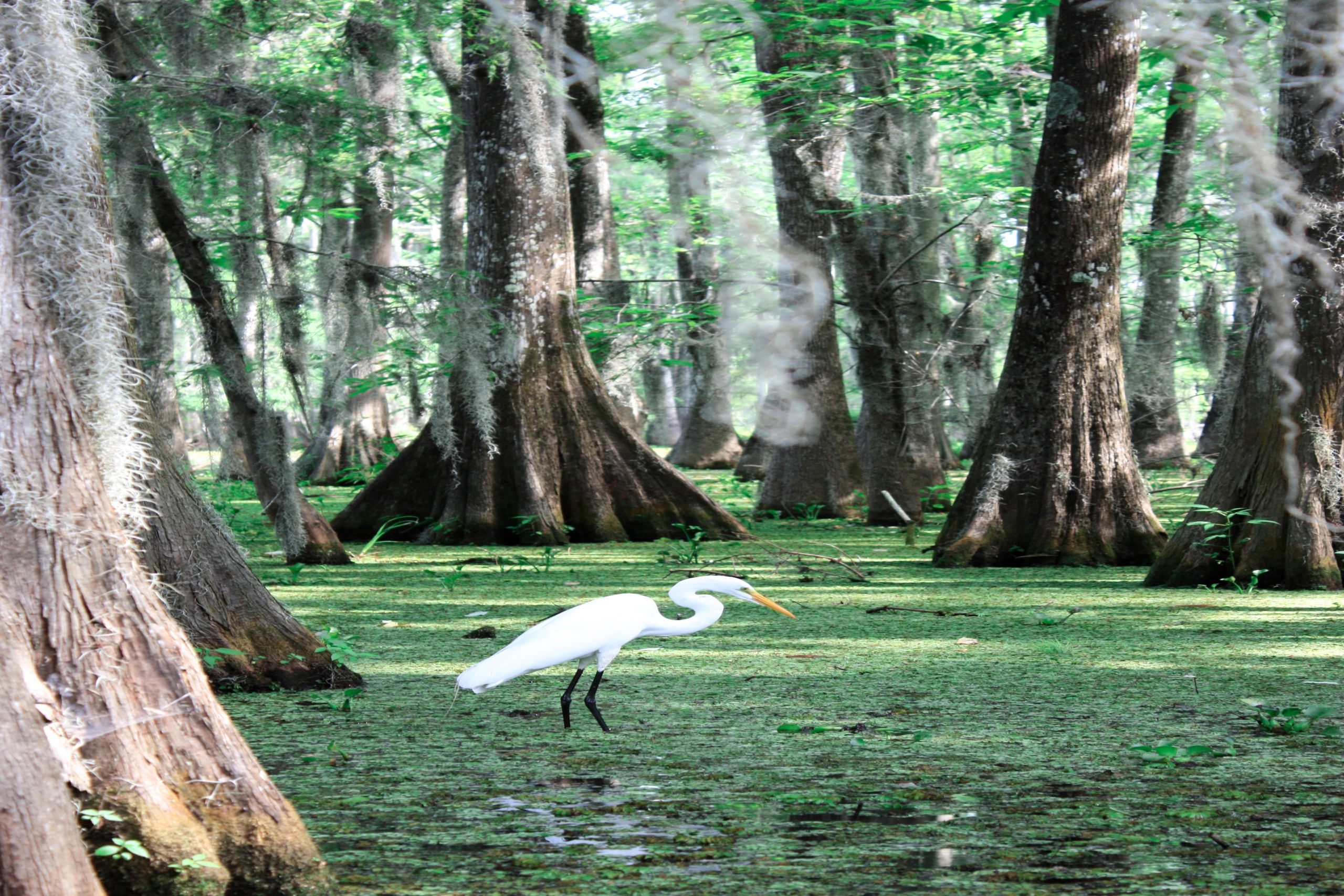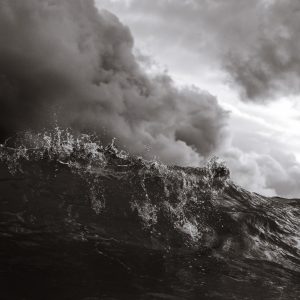Billy Helm tore his shirt on a tree branch before he got to the witch’s shack deep in the swamps that spread out from the bayou. He’d be in trouble for the shirt, but he’d already accepted trouble when he sought out the witch who lived not only outside of the town of Boggy but also outside of its citizen’s prayers.
Sally Langer’s lonely shack sat on a slice of dried mud wedged between the black butterfly wings of the swampwater, framed by the pale bone fingers of rotting trees that rose out of the muck. It looked near ready to fall over come the first stiff wind: sunbleached boards of uneven cut, little windows with just tattered curtains aflutter, a crumbling brick chimney, and a peeling tarpaper roof set at a sharp slant. The door, more like what you’d see on a stable or outhouse than on a proper home, was ajar and following the will of the wind, swinging slowly as Billy walked up.
He stood outside the doorway, digging for the courage that had carried him out of town and across the swamp. This ain’t for me but for Grandpa, he reminded himself, and took himself over the threshold, onto the dirt floor. He expected it would smell inside. Old folks tended to smell (Grandpa always did), and witches must’ve been a special breed of old. But this wasn’t old woman smell; wasn’t swamp smell neither. This was something rancid, like old hoop cheese left too long to air and gone to fuzzy mold.
It was a small place inside the shack, but it was like the sunlight was shy to its contents. He could see the dirt floor just past his feet and not much else. A table and a knife on that table. A full wash basin by the window, a fingerful of sunshine aswirl in the water. He looked the other way, and something moved.
He held in his breath, the smell stronger now. There was a chair, a big, deep armchair, and someone was sitting in it, steeped under the murk.
“Missus Langer?” Billy said. As small as the shack was, Billy’s voice came back at him as if he were under the yawning rafters of the First Methodist.
The witch’s head, which had been lying limp on her shoulder, now lifted and straightened, and lank gray tresses spilled out. In the same instant, the door rattled shut behind Billy. Somehow the snuffing of the sunlight made him see better, not worse.
There she was, sunken into her armchair. She didn’t look right. Not in the way that ugly people don’t look right, more that her skin didn’t fit, like a garment not pulled into its right position. There was nothing in her eyes. Not eyes even, just eyeholes, black gaps in the face, and in those gaps something squirmed. Her withered arms, her sunken chest, her whole body was motionless and yet in motion, like watching a cat under a bedsheet, something was moving under her clothes and skin.
“Who are you?” asked a voice, wet, croaking, gurgly. Like what Billy thought it would sound like if a frog could talk.
He didn’t want to talk, but he was more afraid of not answering. He found his courage as he remembered why he’d come, out of love for his Grandpa, and as Momma would tell it, He that feareth is not made perfect in love. “Billy Helm, Missus Langer.” And then, into the following silence, he added, “I’m Herbert Helm’s boy.”
“Billy Helm,” the voice, which Billy now realized wasn’t exactly coming from where the witch sat, said. “Missus Langer. Yes. The witch. You came to see the witch. Why?”
He wished he was home and that his Pa had him bent over his knee and was giving him the spanking his obstreperousness deserved.
“My Grandpa died.”
Silence. What sounded like a snake slithered somewhere in the gloom, and something cold and damp brushed past Billy’s ankle.
“Are you a Christian boy, Billy Helm?”
Billy nodded his head, even though that felt like a lie. If he were a Christian boy, he wouldn’t be here, he’d have listened to Momma and Pa and the preacher who said when Grandpa died, he ought to pray and so help his soul to heaven. But Grandpa couldn’t whittle him boats to launch on the bayou from heaven, nor take Billy fishing or share an extra slice of pie or buy him Coca Cola at the general store.
“Do you like…checkers?”
“Beg pardon?” Billy asked.
The kitchen table lifted off the ground, its timbers groaning as something dragged it across the room toward where the witch sat. The knife fell off and stuck into the dirt floor between Billy’s feet. A slender, vine-like appendage that seemed to come from out of the dark laid down a checkerboard. The witch’s head now looked at the table before it as another of the snaky tendrils opened a box of checkers and began to set the board. Billy liked checkers fine. When he was playing with Grandpa, anyway. Once a week after church, for every Sunday Billy could remember, they’d play a game.
“We will play a game, Billy Helm. We will make merry. Sit down.”
A stool skidded out from the dark and came to settle on the other side of the table. Billy found himself sitting down. His heart was doing funny things somewhere between his chest and throat.
The board on the table wasn’t like Grandpa’s board—his had come from a magazine, and was made of yellowed felt. That one probably lay in Grandpa’s bedroom, untouched along with the rest of his effects in that place where only dust slept now. This one was a piece of folding cardboard someone had drawn a checkerboard on with a carpenter’s pencil. The pieces, though, were carved wood bought from the general store, same as Grandpa’s. Billy’s pieces were the red ones.
“Red goes first. Or have the rules changed since last I came here?”
“No, you’re right.” Billy hesitated before picking up a piece on the far right side and moving it up and left.
The witch watched the board, but her arms didn’t move. At this point, Billy had come to accept they wouldn’t, much as he’d come to accept yesterday morning that Grandpa wasn’t going to rise from his bed. Instead of the hands moving, one of the snaky things slithered out from the witch’s dried lips like a tongue made of swampvine and nudged one of the black pieces forward.
On Billy’s second move, his hand was so clammy, so jittery, he forgot all about the wisdom of John 4:18 and dropped the piece. It rolled off the edge of the table, and when he went to reach down for it, the voice stopped him.
“No. What is fallen is fallen.”
One of the tendrils found the lost piece and carried it to the witch’s mouth, where it disappeared, followed by a crunching sound. When a black piece first took a red piece, the thing wearing the witch’s skin took the captured piece and devoured it the same way.
“Missus—Mister, whatever you are,” Billy struggled to find the words. “What do I stand to lose here?”
Playing with Grandpa, he hardly ever lost. And when he did, all Grandpa demanded of him was, “A firm, friendly handshake.”
“You are not enjoying yourself,” the voice said. It sounded sorry, even a little sad. “Are you thirsty? I come from nothing but thirst and dust. Would you like a Co’ Cola?”
In the dark, a bottlecap pinged off a bottle and clinked onto the ground. One of the tendrils set down a dusty bottle of Coca Cola before Billy. It did not fizz even though it was freshly opened. When Billy gripped the smooth glass, it was warm like skin. He lifted it, watched by the witch’s empty eyeholes, and then tipped the mouth of the bottle into his own. Flat, warm, sweet, but also musty.
“The witch offered me a Co’ Cola, I think in jest. To mock me was her last mistake. Many on this side believe favors can be extracted by force of will or trickery. What do you believe, Billy Helm?”
Billy took another sip because his mouth was so powerfully parched that his lips were sticking together. “I just wanna go home.”
“Our game is not yet finished. Please, it is your move.”
Billy couldn’t think. He pushed a piece into a spot he shouldn’t have, and a blink later, the piece was crunching inside of the thing’s stolen mouth, while a black piece had slid into a kingmaking square.
“King me.”
Billy had already lost five pieces and had taken none. What would happen when he lost them all?
“It is a welcome diversion to be here, to see a glimmer of something other than dust. Do you enjoy your home?”
Tears welled in his eyes, and snot bubbled in his nose as he nodded.
“But home is not what it was, yes? You miss your Grand-Pa.”
“Yes.”
He did his best, but Billy Helm had never been much at checkers, and the thing in the witch’s skin must have been some kind of old hand. He was starting to think Grandpa let him win all those times so he wouldn’t pout. Give a man a fish, as Pa would say. By the time Billy was down to four pieces, he knew it was over but kept playing for lack of choice.
And then it came, his last piece crunched like a ginger cookie.
“You played well,” the thing said.
Billy was holding the kitchen knife under the stool, but the way his arm shook he knew he’d not stand a chance even if the thing had it in mind to fight fair. But the thing did not grab him. Instead, it folded up the checkerboard. In the next moment, the door opened, and with its opening came a flood of light and fresh air.
“You have played a game with me. You have softened my solitude. For this, I will grant you something. I can guess what you would ask for, but you must give it breath for me to make it so.”
Billy considered the half-drunk Coca Cola and took another sip. It wasn’t just flat, it was also dusty, somehow. His throat felt drier than if he’d drunk nothing.
He looked out the open door, then back at the thing in the shadows. He opened his mouth to make his wish heard.
~ ~ ~
It was dark when he got back to town. His shirt and his shortpants were badly piled and torn from the grabbing branches and the waitawhile vines, and his shoes were more mud than leather now.
On the way to home he passed First Methodist, whose doors were always open. That’s where Grandpa was now, waiting until his funeral slated for tomorrow morning. There didn’t seem to be anyone about, and after what had happened in the swamp and the witch’s shack Billy was flush with a new, bright courage.
He strolled into the church, up the nave, past the pews, into the back room where Grandpa’s body lay on the cooling board under the light of a kerosene lamp hanging from an iron hook. A linen sheet covered most of him, but the top of the forehead and the withered scalp with its sprig of gray—like the first tuft of grass come after winter—still showed, as did the toes with their curled yellow nails set in their wrinkled gray beds.
He’d seen the body before, but it didn’t scare him as much now as it did when he’d found Grandpa stiff and gray and cold under his bedsheets yesterday morning. Maybe it was that he’d met a greater terror in the swamp, or maybe it was the knowledge that Grandpa’s deep, strange sleep was no more a forever thing. There is no fear in love, but perfect love casteth out fear…
The preacher, Tom Bottom, caught him sneaking out and shouted blue hell at him before dragging him all the way home, where Momma was looking like she might tie herself up into a knot from worry, and Pa greeted him with a simple, disappointed grunt, “Boy.”
Momma washed him in the tub and scrubbed him with the boar bristle brush, like he was eight years old again, someone incapable of washing himself. “Why on Earth would you go out into the swamp like that?”
He didn’t answer. He wouldn’t tell. Even a whisper of a wish would kill it, or wasn’t that the way of things?
“You’re not to go there, it’s unwholesome. In the wilderness, there is no way. Recall that, child.”
“Yes’m.”
After Momma finished washing him, Billy went to his room, where he expected, accepted that he would be given a powerful spanking, maybe even a birching with the willow switch. But once Billy and Pa were alone in his bedroom, Pa sat down on Billy’s bed and dropped his face into his hands. Maybe he just didn’t have the get-up in him right now to manage a birching. Pa was a big, strong man, a gut like a washtub and a face brick red from the sun, with squinty little eyes. Grandpa had had the same eyes, only they were a kinder blue than Pa’s smoky gray.
“Dying’s a strange property,” Pa said. His mouth hung open like he had more to add, but nothing came, at least not until after a long while. “You ought to keep home. We want you here, your Momma and me. We—it’s good for family to stick close when death comes to visit.”
“Yessir.”
Pa reached out, and Billy flinched, but all he did was ruffle Billy’s hair. “You were some pair, weren’t you?”
“Sir?” Billy looked up into the face looking down at his. A stranger’s face, a stranger’s eyes. Something he’d never quite seen in Pa was looking at him. A smile looked wrong on Pa’s lips, and it startled Billy as much as anything he’d seen in the witch’s shack.
“When I was a boy, see, to me, he wasn’t always—well, things are different, I guess, for fathers. Easier to be a grandpappy; all that takes is kindness. Being a father is more’n that. I expect you’ll know one day.”
For as tired as he looked, Pa had managed more words at once than Billy could ever remember him saying other than to give grace or recite at church services.
Maybe Billy ought’ve said something back. But he couldn’t think what to say, and soon Pa was rubbing his head again, and soon Pa had stood up and said Billy would keep to his room and say his prayers for Grandpa until supper was ready, and they called him to the table.
Billy got on his knees, and he did pray, but not for Grandpa. He knew that was taken care of already.
When dinner time came, Billy sat at the table with Momma and Pa, Pa at the head of course, and Pa led them in grace. With his eyes shut and his head bowed, Billy couldn’t suppress a smile, knowing what would soon come. All the love and surprise and happiness.
Pa had gotten to “…which we enjoy at this table” when the neighbors’ dog started barking. This wasn’t the ordinary woof, but something crazed, a desperate baying. Pa unfolded his hands and looked up.
“That dog of theirs,” Momma said. “Always barking like to break the walls of Jericho.”
She sounded nervous, even before they all heard the rasp of the gate latch lifting and dragging footsteps coming up the footpath. Pa got up and went to the window and looked through the curtains before he turned to Momma and told her to take Billy into their bedroom.
“What is it, Pa?” Billy asked. He knew what—who—it was. The only thing that scared him was the look in his father’s face—not the joy that should have dwelt there now.
Momma took Billy in her arms and tried to lead him to her and Pa’s bedroom, but when Billy wouldn’t go, she picked him up. He was getting big and heavy in the fullness of his eleven years, but she still just about managed to carry him, even when he tried to wriggle out. The last thing he saw before she shut them up in the room was Pa picking up the old turpentine axe from where it hung on the wall. His face had gone pale as a jumping mullet’s belly.
Inside the bedroom, Momma held Billy close, her lips mouthing prayers into his shoulder. Outside, Billy heard the ghosts of sounds—Pa grunting, something wriggling in the dirt and grass. Then he heard the front door swing open and stay open. Then he heard something heavy thump onto the floorboards. Then a sound he didn’t think real because it was impossible: his Pa weeping. Plain bawling like a child.
~ ~ ~
He walked straight from the funeral, in his fine funeral clothes, which were soon filthy from the swamp muck. No one seemed to notice him slipping out at the conclusion of the service, while the reverend was delivering his final, distracted blessings to the departed.
Billy didn’t quite feel anger. He didn’t quite feel anything, but he knew this was not what was meant to happen, not what he had asked for.
Closed casket, it had been. No one said why, but the whispers going around the church before the service started—(a child like Billy always overheard these whispers, as grownups were never as quiet as they thought to ears lower to the ground)—had it that it was on account of the body being chopped into pieces so it couldn’t get up a second time.
There were other whispers, and these were still going around even as Tom Bottom, with his lost eyes and stumbling voice, droned on about Lazarus and Elijah—whispers that a swarm of eels had slithered out of old John Helm’s body after his own son cut it down on his porch.
Billy hadn’t seen any of it himself. He didn’t much care how much of it was true or if all of it was. All he knew was things hadn’t gone the way they ought’ve.
After the service, anger pushed him down the same path he’d traveled the day before, back to the witch’s shack.
This time, the door was closed, its handle tied shut with a loop of pale Spanish moss. He hesitated only a second before tearing up the feeble binding and dragging the creaking door open. The smell was stronger than yesterday, the dark thicker, but he stepped inside.
“Witch,” he said. “Missus. Mister. Whatever you are, I gotta talk to you.”
He made it two steps in before something snagged on his muddy shoes. It was like a thin blanket, deceptively heavy, and it wasn’t until he tried to shake it off that he realized what it was: the witch’s skin, shed now. His face tingled with a greasy nausea, and his legs wobbled under him.
He looked up, and he couldn’t see nearly as far into the dark as the last time, and yet what little light that struggled in through the open doorway shone on what looked like piled coils of slick, wet rope.
The voice spoke now, sharper, clearer now that it wasn’t muffled under the borrowed skin. “Billy Helm, you’ve come back. Did you not see the door was shut?”
He remembered his anger and found his voice, “Because you didn’t do what you promised.”
“You wished for your Grand-Pa to rise again. And so he did.”
“That wasn’t him. That was something else came to our door. And Pa—Pa, he—”
Billy choked up, sputtered. Half of it was the awful weight in his chest, and half of it was the reckoning that the door had just slammed shut behind him.
“I have no games to play with you, no Co’ Cola to offer. And you have already exhausted your favor.” Something was moving, in every direction, unseen tendrils crawling over the ceiling, the walls, snaking over the floor, encircling Billy. “You leave me with few options.”
The first tendril entered through Billy’s ear, and after a pinch of pain when it encountered resistance, a startling lightness followed, starting in his head and sinking down into the rest of his body, and then it was like there was no weight or hurt in him at all. The long feeler felt through him and dug a new earhole out the back of his skull. Grandpa spoke into it from somewhere dusty.




